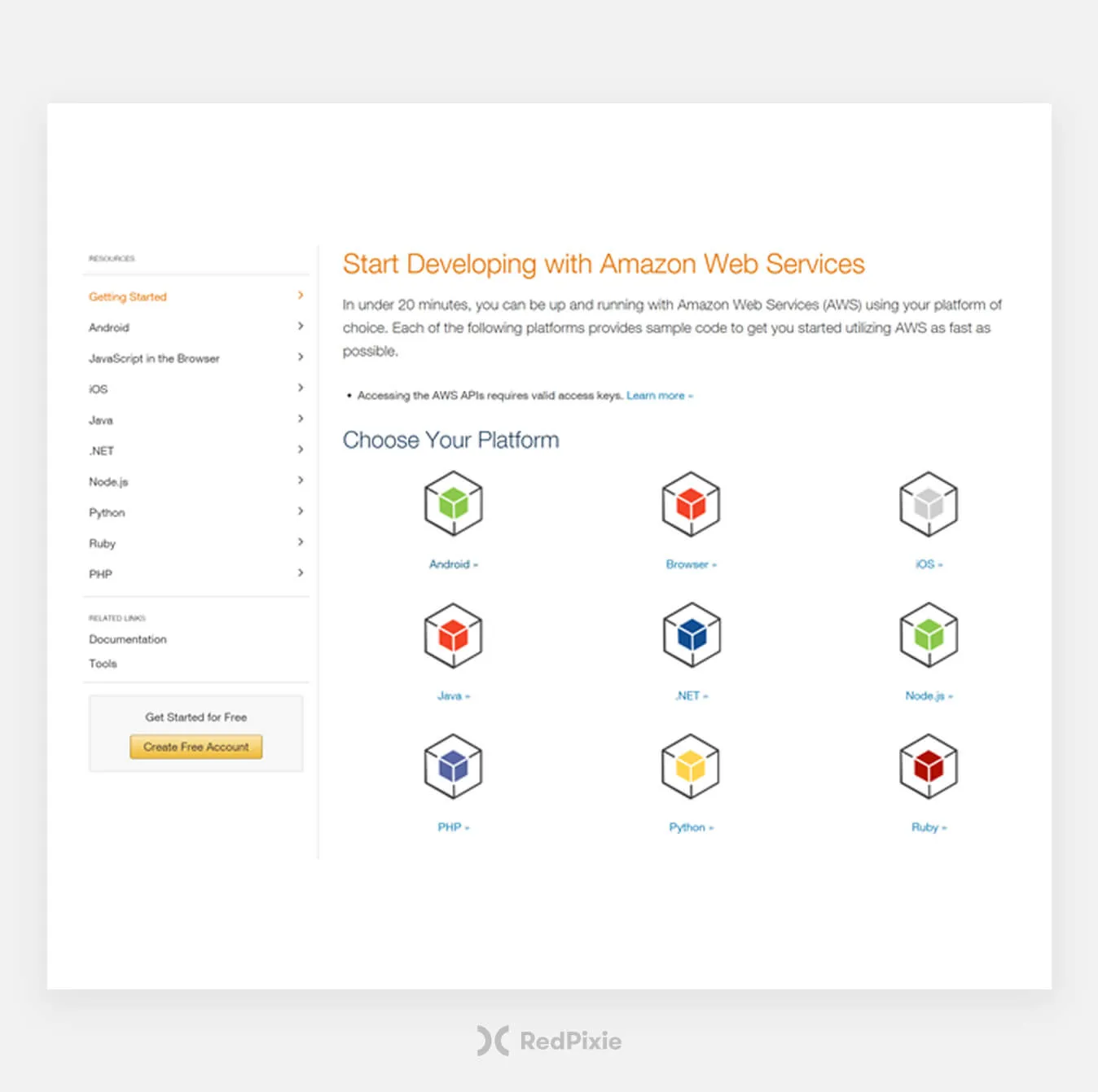TL;DR

While the choice of private / hybrid / public cloud might be a difficult decision, there is a larger matter that must be conquered first:
AWS vs Azure vs Google Cloud [Platform].
While these three cloud providers collectively dominate this sphere, their approach to cloud computing is strongly dictated by their background.
Amazon has a wealth of experiencing in collating and aggregating vast sums of data; Google’s strengths have come from an analytical methodology, while Microsoft’s heritage stems from computing.
It is especially important to understand the above, because, as will be seen below, your best option may not always involve just one cloud provider.
Furthermore, this comparison will note the similarities and differences, and, as per RedPixie’s philosophies, these activities should first be tied to business objectives.

AWS vs Azure vs Google Cloud: Pricing
One of the great benefits of Azure, AWS and other cloud providers is their competitive pricing strategies.
Looking for a pure Microsoft Azure vs AWS guide? See here.
They are all fighting to take workloads and migrate them to the cloud, in view of the recurring revenue they receive. This type of commoditisation has forced a very open, online pricing model.
In conjunction with this, there has been an ongoing effort to provide PAYG pricing. While some may think this an obvious benefit of the cloud, the degree to its level is changing.
Previously you may have paid based on monthly usage, but even that is improving. You are now able to pay per minute:
You pay per minute, not per hour, which is how a cloud should work.
We’ll break this down further by platform in assessing the differences in AWS vs Azure vs Google Cloud pricing.
Further reading: How to become a successful CFO in 2017.
AWS Pricing
Starting off with Amazon Web Services, the level of pricing associated with different cloud offerings is easily presented from SMB to Enterprise.
This is one of the best assets of the cloud, that as an organisation you don’t have to buy a quickly outdated private cloud solution. You merely note your activities, and the cloud will adjust accordingly.
As can be seen below, their three-tier model, according to storage is very helpful if you just need to put some data in the cloud. Unfortunately, when it comes to storing 50TB - 500TB, the percentage price difference isn’t that large.
Moreso for feature differences, but you will see that the lack of monopoly in this space is because of the ‘horses for courses’ argument.
Example: Amazon may be great for large databases, but when it comes to putting apps in the cloud, Microsoft is more equipped.

Helpful Resources
These AWS pricing details are helpful because, like Azure and Google, the levels of cloud tiers do vary greatly and it’s good to compare them against your requirement.
We also have TCO, which is important when building a business case and gaining a better estimation of what is needed to hit organisational needs.
Azure Pricing
Similarly, there are many compelling elements to Microsoft Azure.
Azure also has a breakdown of the various pricing situations, there pricing is more aggressive in certain section than Amazon and Google, owing to their desire to lead segments of the cloud. This includes elements such as moving apps into the cloud.
Helpful Resources
For Azure, the TCO calculator answers the following questions:
Would you like to lower the total cost of ownership of your on-premises infrastructure?
What are the estimated cost savings of migrating application workloads to Microsoft Azure?
Google Cloud Pricing
Lastly, Google Cloud.
Google’s pricing model attempts to go head-to-head with its core competitors while emphasising its desire to bill based on exact usage.
Here are some of their core pricing values:

Helpful Resources
AWS vs Azure vs Google Cloud: Features
Beyond comparing the pricing of these three cloud heavyweights, their features are also a very interesting factor in comparing.
In general, this activity is very useful when you consider which cloud partner is best suited to your desired outcome. For example, while all may cover data analytics & visualisation, you may think that Azure is the most progressive in this area, and the best horse to follow.
All three of AWS, Azure and Google have their own way of categorising the different elements, so our suggestion is to start from requested projects, and then work with partners to establish the best solutions.
Unfortunately, we often see organisations that are so committed to AWS for example, that they fail to recognise possibly more economic, and efficient alternatives.
AWS Features
Kicking off this section we have the AWS products.
Like the other two cloud providers, Amazon uses different codes and names to breakdown their cloud products. With that said, they fall into the following categories:
- Compute
- Storage
- Database
- Migration
- Networking & Content Delivery
- Developer Tools
- Management Tools
- Security, Identity & Compliance
- Analytics
- Artificial Intelligence
- Mobile Services
- Applications Services
- Messaging
- Business Productivity
- Desktop & App Streaming
- Software
- Internet of Things
- Game Development
See the full list here:

When it comes to AWS solutions, there is equally a large degree of categorisation.
These solutions cover:
- Websites
- Backup and Recovery
- Archiving
- Disaster Recovery
- DevOps
- Big Data
Azure Features
Moving on to Microsoft Azure, they equally provide an enormous array of features, but they add value by providing certain capabilities based on the number of users.
FREE GUIDE
Take your Azure Systems to new Heights
Download your free Azure Hybrid Cloud Guide
Take their Enterprise Agreements [EA], these enable large organisations to earn benefits from committing usage to Azure.
Such benefits include flexible billing and more competitive pricing.
Another feature differentiator to Microsoft Azure is their degree of certification. In which they claim they have more ‘than any other cloud provider’.

A bold statement, but with a similar features range to AWS [see below] - they believed this security can persuade organisations to place their trust in Microsoft.

Further reading: who owns the cloud?
Google Cloud Features
Lastly, you have the Google Cloud platform, which while not necessarily the most historical cloud provider, is throwing its self into Enterprise Computing.
Google has three key points behind their solutions, highlighting:
- Future-Proof Infrastructure
- Seriously Powerful Data & Analytics
- Serverless, Just Code
While we’ve listed their various features below, like the two above, however this video is very helpful in presenting the tone of their solutions:
With all of these features, you might be finding yourself wondering which is the overall best cloud solution provider. In general, you are lucky enough to not worry about this. You can focus on assessing which prioritises you think will provide the most value to your organisation.

AWS vs Azure vs Google Cloud: Implementation
Now that you have looked at the features and pricing, the next question is how you progress from the AWS vs Azure vs Google Cloud battle.
Here are the relevant sources and guides to get you started.
AWS Implementation
AWS provide a nice and easy page to start using their services.
You can see that they break it down by platform you wish to work on, so whether you are making an iOS app, or writing in PHP, they provide some sample code to begin the integration.

Azure Implementation
Unleashing the benefits of Azure is an equally easy journey.
The nice thing about Microsoft's process is that they consider things for the developer and operations, both of which come with in-depth start guides.
FREE GUIDE
Find your Feet in the Cloud
Learn how to choose the perfect IT partner
More importantly, they are an easy forward to the relevant department if you need to check suitability.
We understand that the topic of Azure vs AWS in sometimes for contentious than the three-way battle, so this infographic from InApp may shed a light:

Google Implementation
Lastly, we have the process of starting with Google - named 'Cloud Launcher'.
They equally provide some starting documentation and list some useful benefits, see below.

So there you go, pricing, features and implementation, a fairly lengthy article for a seriously important consideration.
While you may not easily come to a conclusion, at least you will hopefully have the knowledge to make a balanced decision.
Well, that's our summary, make sure to let us know which of AWS vs Azure vs Google Cloud wins in your mind below. Should you wish to learn more, download this guide on hybrid cloud success ⇓





